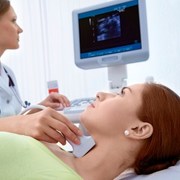Dr. Friedman is it common to have both Hashimoto and Graves disease? Can hypothyroidism be due to a pituitary problem?
Diagnosis of Hyperthyroidism and Determination of the Type of Hyperthyroidism
There are many causes of hyperthyroidism and proper treatment requires both a diagnosis(usually done with history and laboratory tests) and a determination of the type of hyperthyroidism (usually done with history, thyroid examination and nuclear medicine tests). To diagnose hyperthyroidism, Dr. Friedman will measure TSH, free T4 and free T3. A suppressed TSH with an elevated free T4 and free T3 indicates frank hyperthyroidism, while a suppressed TSH with an upper-normal free T4 and free T3 indicates subclinical hyperthyroidism. A suppressed TSH with a low or low-normal free T4 and free T3 indicates hypothyroidism due to a pituitary problem. An elevated TSH indicates hypothyroidism due to a thyroid problem.
Once Dr. Friedman determines that a patient has hyperthyroidism, he then determines which type of hyperthyroidism the patient has. The four common causes of hyperthyroidism are: Grave’s (the most common); toxic multinodular goiter; single hot nodule (Plummer’s disease); and subacute thyroiditis. A young (20-40) female with a rapid onset of hyperthyroidism will often have Grave’s disease, which is an autoimmune disease in which antibodies stimulate the thyroid to make extra thyroid hormones. George H.W. and Barbara Bush and Millie (the Bush’s dog) all had Graves’s disease. Barbara, but not George H.W. had exophthalmos (protuberance of the eyes seen in about 50% of patients with Grave’s disease). I’m not sure about Millie. Toxic multinodular goiter is more common in older patients, especially those from iodine-deficient areas (Mexico and Central America, parts of Africa and Europe and older patients from around the Great Lakes region). In toxic multinodular goiter, the goiter is often very large and long-standing. In a single hot nodule, only a single nodule is palpated. In subacute thyroiditis, the thyroid is tender and the patient has symptoms of a viral illness. Only in Grave’s disease is exophthalmos seen.
To determine what type of hyperthyroidism the patient has, Dr. Friedman will rely on history and physical examination and also use nuclear medicine testing (thyroid uptake and scan). In Grave’s disease, the thyroid gland will be diffusely enlarged and smooth and exophthalmos will be present. The thyroid uptake and scan will show high uptake in all parts of the gland. In toxic multinodular goiter, the thyroid gland will be enlarged with multiple nodules. Thyroid uptake and scan will show a high uptake with a patchy distribution. In a single hot nodule, only one nodule will be felt and the thyroid uptake and scan will show a high uptake in one nodule with suppression of uptake in the rest of the gland. In subacute thyroiditis, the gland will be enlarged but tender. Thyroid uptake will be low. Thus, a careful examination and nuclear medicine testing can distinguish the different causes of hyperthyroidism.
More on Dr. Friedman
Theodore C. Friedman, M.D., Ph.D. has opened a private practice, specializing in treating patients with adrenal, pituitary, thyroid and fatigue disorders. Dr. Friedman has privileges at Cedars-Sinai Medical Center and Martin Luther King Medical Center. His practice includes detecting and treating hormone imbalances, including hormone replacement therapy. Dr. Friedman is also an expert in diagnosing and treating pituitary disorders, including Cushings disease and syndrome. Dr. Friedman's career reflects his ongoing quest to better understand and treat endocrine problems. With both medical and research doctoral degrees, he has conducted studies and cared for patients at some of the country's most prestigious institutions, including the University of Michigan, the NationaI Institutes of Health, Cedars-Sinai Medical Center, and UCLA's Charles Drew University of Medicine and Science.
Visit Dr. Friedman on the web: http://www.goodhormonehealth.com




